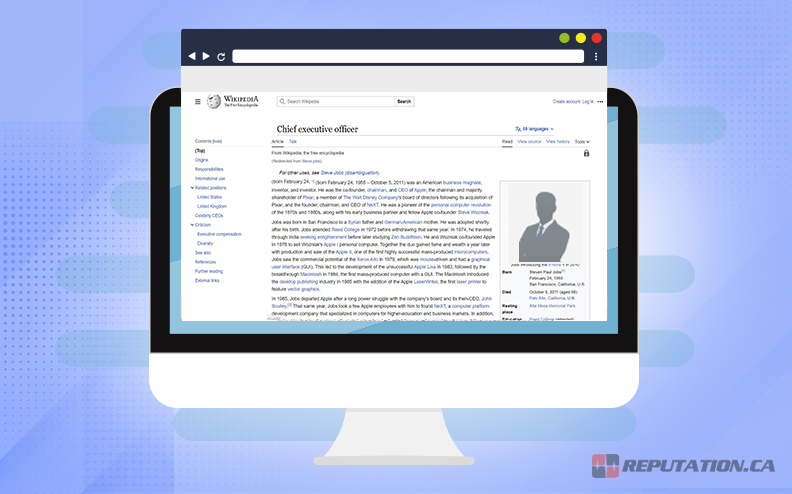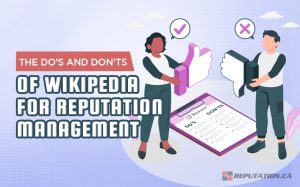The Internet is one of the primary sources of information for modern society since it contains almost everything we need to know. Unfortunately, online discourse leads to disturbing misinformation fueled by preconceptions, social interactions, and political leanings. Everyone wants to be right and will do everything possible to make that a reality, but not everyone uses honest means to reach that goal. Some people actively manipulate information to try and make their stance seem correct, even when all evidence points to the contrary.
Fortunately, there are resources we can use to fact-check information (though some are more reluctant to do so when the false claims echo their beliefs). One of the biggest concerns with online information is its role in identifying individuals who might be considered “controversial” by modern standards.
One website that has become particularly popular for information gathering is Wikipedia, which has been used since its creation for general summaries of people, places, organizations, and cultures. Some claim Wikipedia is unreliable since it is a free-source site that enables any user to edit the articles posted on its domain. They omit that Wikipedia’s administrators have contingencies to protect their content from being abused.
Unfortunately, this has not stopped certain individuals from trying to create articles that are favorable to them while misinforming users. This has led to concerns surrounding CEOs and other major individuals creating Wikipedia pages about themselves. The question of the hour is: How does creating these pages work?
Who Can Create a Wikipedia Article?
The simple answer to this question is “anyone,” since any knowledgeable user can create an article on a topic they are familiar with. In this regard, the concerns about Wikipedia’s veracity are not completely unfounded since there is only so much the site can do to limit new contributors.
Technically, you could easily go on Wikipedia and create a new article to submit to the website’s administrators. However, the second half of that sentence is important since the administrators must assess every new article before it is published for general consumption. Anyone whose articles are officially published is internally recognized as “Wikipedians” by the site’s administrators, but there is no power behind the title.

An established “Wikipedian” is no more important than a new one, allowing information to be published with minimal bias or preconception. According to the website, there are 46,193,595 Wikipedia users with registered usernames (and can make official edits and articles for the website).
A registered username on Wikipedia is not a prerequisite to posting new content since countless unregistered users post articles and edit existing content. Wikipedia does its best to monitor who contributes to the website, but its administrators mostly focus on curating the content itself. When newly submitted content does not meet their standards, it is rejected, but the user who submitted it is not necessarily barred from making new submissions later.
The main goal of their curation is to prevent articles from being published if they violate Wikipedia’s requirements. Despite being open to user edits, Wikipedia has fairly strict requirements for new articles that limit who can post what. One of Wikipedia’s biggest restrictions is that no one with a conflict of interest can post articles.
Why Does a CEO Need a Wikipedia Page?
If you are reading this article, you are likely aware of what a CEO is and are likely one yourself, but there is some information pertinent to a CEO’s role that affects who can publish in your stead. A chief executive officer (CEO) is the highest position within a company’s leadership structure and reports only to the company’s board of directors. The main goal of a CEO is to maximize the company’s market value by ensuring it operates according to expectations and maintains a certain dollar value.
Specifically, a CEO must keep the company’s share price, market share, and revenue high to ensure the company remains successful. This task has become more difficult due to the recent economic downturn in most countries, but it is expected that the CEO can navigate these obstacles. Depending on the company’s structure, a CEO’s powers can be fairly limited if they are merely delegates for someone higher on the command chain, but the CEO is almost always the top official.
Sometimes, the role of CEO is eliminated, and the company’s president fills their function instead, but that varies by company. The CEO serves at the board of directors’ discretion and can be fired by the chair of the board (COB) if they are underperforming. If the CEO is also the COB or is that majority shareholder, this is not an issue since they can reassert control over the board. For the most part, CEOs are beholden to the board’s demands and can seldom overpower them.

Part of being an effective CEO is maintaining the company’s image. If a company’s reputation suffers, it loses business, and its overall value falls. Once upon a time, a business’s reputation was exclusively based on the quality of its products and services, but recent sociopolitical trends have changed that.
There is a growing trend in which the general public looks for information about a company’s leadership to determine if they are “problematic.” This usually means digging up the individual’s past and looking for anything they might have said or done that does not align with modern morality. Most of the time, the transgressions are minor mistakes that no longer reflect who you are, but the fact that you made the mistake is enough for certain groups to call for your dismissal.
Unfortunately, this has a disturbingly high success rate since many have lost their jobs due to public outrage. If you are the CEO of a company, having your past mistakes dredged up could cause certain customers to call for a boycott that affects the company’s profits. This, in turn, could cause the board of directors to view you as a liability to their success and terminate you to appease the masses. Therefore, you might need a little good publicity by creating a Wikipedia page to outline your contributions outside the company.
Can You Make Your Own Wikipedia Page?
Creating a Wikipedia page about yourself might seem great in theory since you can explain your ascension to the CEO role and promote acts of philanthropy outside the business. Unfortunately, that idea has one major flaw: Wikipedia will not let you make your own page. We mentioned that one of Wikipedia’s main concerns is preventing contributions to the website that constitute a conflict of interest. Writing an article about yourself, especially to make yourself look good to the public, is the highest form of a conflict of interest.
Wikipedia’s mission statement is to give readers reliable, factual information about any subject they can imagine. This means Wikipedia articles publish the good, the bad, and the controversial details surrounding any specific individual. Therefore, any plan to publish an article about yourself that omits past mistakes that are public knowledge or can be fact-checked is a massive violation of Wikipedia’s standards.

If you were going to make an article about yourself, you would have to include the information you would prefer to keep away from the public. This could be a problem for you if that information could get you terminated or spark outrage among customers. Conversely, you might be perfectly fine with publishing this information if you believe your philanthropic history will balance the scales.
Unfortunately, Wikipedia is not fond of this and tells users to avoid writing articles about themselves completely. The principle is that even the most honest individuals might subconsciously omit embarrassing or unpleasant details about themselves. As a result, it is almost impossible for someone to write an impartial article about themselves that meets Wikipedia’s standards. Instead, Wikipedia’s creators believe that anyone noteworthy enough to have an article about themselves on the website will lead someone else to make the page.
The idea of having a complete stranger write a Wikipedia article about you might not be pleasant, but it is the ideal scenario as far as Wikipedia is concerned. Any attempt to publish an article about yourself will likely lead to Wikipedia’s administrators taking it down once they connect you to the page. Fortunately, you are not completely powerless regarding your Wikipedia page since you can still control certain details.
Can You Edit the Wikipedia Page About You?
Publishing new articles is not the only thing users can do, though it is one of the most advanced abilities. In addition to publishing new content, Wikipedia users can edit existing articles to reflect new information and delete outdated or inaccurate data. For example, the Wikipedia article about the actor Elliot Page was edited to reflect his new identity following his transition from male to female.
The edits included changing the article’s title and clarifying Elliot’s original name (Ellen) before the transition (as well as explaining his origins as being identified as female at birth). This article alone proves that a Wikipedia page can be extensively edited to reflect new information while remaining factual. While the exact user who made the changes to Page’s article is unknown, it is unlikely that Page himself did it. However, it would have been within his rights to do so.

While you cannot write the entire article about yourself, you can edit it as long as the information you change is impartial. For instance, you cannot delete a section discussing a controversy about you if you only delete it to save face. If the controversy is disproven, you can edit the section to explain that the allegations against you are no longer valid. It is worth noting that these edits must be performed carefully since Wikipedia’s editors will reverse the changes if they find them violating its standards.
Conversely, if your edits are factually sound and not phrased to make yourself look good, Wikipedia’s administrators might leave it in. Unfortunately, even these edits are subject to additional scrutiny and might be reversed because the article’s subject made them. This makes Wikipedia page management a delicate process since the potential for a conflict of interest is so high. Fortunately, some alternatives are slightly more acceptable in the eyes of Wikipedia’s team of administrators.
Can You Hire Someone to Manage Your Wikipedia Page?
Considering Wikipedia’s standards, this question is slightly more complicated than you might expect. The best answer is a tentative “yes,” with added conditions to limit your team’s abilities. Any company you hire to manage the Wikipedia page about you must disclose their status to Wikipedia’s administrators. This likely adds more scrutiny to any changes since there is a possible conflict of interest.

Getting paid to edit an article on the subject’s behalf is complicated. Nevertheless, Wikipedia allows it as long as your team adheres to its guidelines and does not make any changes that are not factual. The trick is finding a team you can count on to honor Wikipedia’s requirements while also making the necessary adjustments to keep the article from destroying your reputation.
Take Your Reputation Back!
Managing a Wikipedia article about yourself can be trickier than you might have originally thought, but it is possible. The biggest challenge is managing it without running afoul of Wikipedia’s administrators, meaning you probably need a hands-off approach. You will likely never successfully publish an article about yourself, but you can edit it if you do not make unrealistic changes. Ultimately, your best bet is hiring a 3rd party to make edits per Wikipedia’s guidelines to bolster your reputation.

We at Reputation understand how frustrating having so little control over an article about you can be. We offer a comprehensive reputation management service designed to improve your public image without shady practices. We offer traditional services like social media management and SEO optimization, but we can also manage Wikipedia articles on your behalf (within the site’s guidelines).
We can ensure false information is removed and help you outrank the search results that attempt to perpetuate it. There are no shortcuts concerning public image, so visit our website and take your reputation back!







